

Culture & Meme. Googlewhacking: The Search for The One True Googlewhack. Googlewhack. A Googlewhack is a type of contest for finding a Google search query consisting of exactly two words without quotation marks, that returns exactly one hit.
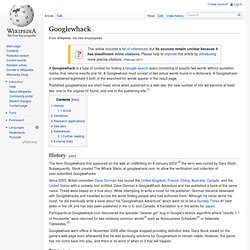
A Googlewhack must consist of two actual words found in a dictionary. A Googlewhack is considered legitimate if both of the searched-for words appear in the result page. Published googlewhacks are short-lived, since when published to a web site, the new number of hits will become at least two, one to the original hit found, and one to the publishing site.[1] History[edit] The term Googlewhack first appeared on the web at UnBlinking on 8 January 2002;[2] the term was coined by Gary Stock.
Culturomics. Cultural Observatory (culturomics) Visualizing Our Word Origins. English Letter Frequency Counts: Mayzner Revisited or ETAOIN SRHLDCU. Now we show the letter frequencies by position within word.
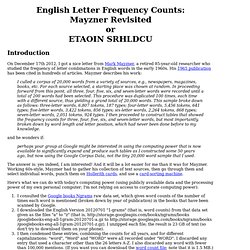
That is, the frequencies for just the first letter in each word, just the second letter, and so on. We also show frequencies for positions relative to the end of the word: "-1" means the last letter, "-2" means the second to last, and so on. We can see that the frequencies vary quite a bit; for example, "e" is uncommon as the first letter (4 times less frequent than elsewhere); similarly "n" is 3 times less common as the first letter than it is overall. Ideas Illustrated » Blog Archive » Visualizing English Word Origins.
I have been reading a book on the development of the English language recently and I’ve become fascinated with the idea of word etymology — the study of words and their origins.

It’s no secret that English is a great borrower of foreign words but I’m not enough of an expert to really understand what that means for my day-to-day use of the language. Simply reading about word history didn’t help me, so I decided that I really needed to see some examples. Using Douglas Harper’s online dictionary of etymology, I paired up words from various passages I found online with entries in the dictionary. For each word, I pulled out the first listed language of origin and then re-constructed the text with some additional HTML infrastructure. ResearchFlow. Culturomics. Books Ngram Viewer.
Our adventures in culturomics. Peter Aldhous, Jim Giles and MacGregor Campbell, reporters (Image: Michael St.
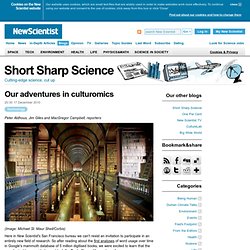
Maur Sheil/Corbis) Here in New Scientist's San Francisco bureau we can't resist an invitation to participate in an entirely new field of research. So after reading about the first analyses of word usage over time in Google's mammoth database of 5 million digitised books, we were excited to learn that the search giant has provided a neat tool, the Books Ngram Viewer, to perform your own "culturomic" studies. Diving straight into the US culture war, this result made us exclaim, "Science be praised! " Culturomics. Further reading[edit] References[edit] External links[edit]
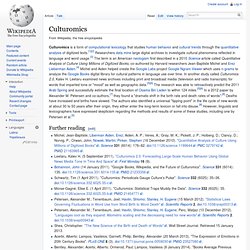
Google: Le plus grand corpus linguistique de tous les temps. Lorsque j'étais étudiant, à la fin des années 70, je n'aurais jamais osé imaginer, même dans mes rêves les plus fous, que la communauté scientifique ait un jour les moyens d'analyser des corpus de textes informatisés de plusieurs de centaines de milliards de mots.
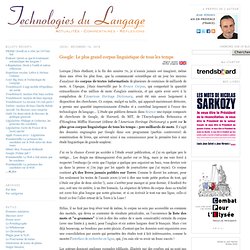
A l'époque, j'étais émerveillé par le Brown Corpus, qui comportait la quantité extraordinaire d'un million de mots d'anglais américain, et qui après avoir servi à la compilation de l'American Heritage Dictionary, avait été mis assez largement à disposition des chercheurs. Ce corpus, malgré sa taille, qui apparaît maintenant dérisoire, a permis une quantité impressionnante d'études et a contribué largement à l'essor des technologies du langage... In 500 Billion Words, a New Window on Culture. The digital storehouse, which comprises words and short phrases as well as a year-by-year count of how often they appear, represents the first time a data set of this magnitude and searching tools are at the disposal of Ph.D.’s, middle school students and anyone else who likes to spend time in front of a small screen.
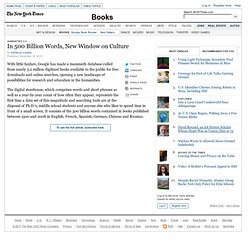
It consists of the 500 billion words contained in books published between 1500 and 2008 in English, French, Spanish, German, Chinese and Russian. The intended audience is scholarly, but a simple online tool allows anyone with a computer to plug in a string of up to five words and see a graph that charts the phrase’s use over time — a diversion that can quickly become as addictive as the habit-forming game Angry Birds. With a click you can see that “women,” in comparison with “men,” is rarely mentioned until the early 1970s, when feminism gained a foothold. The lines eventually cross paths about 1986. The data set can be downloaded, and users can build their own search tools.
Quand Google Books permet de comprendre notre génome culturel. Pour une fois, on va dire du bien de Google dans cette lecture de la semaine.
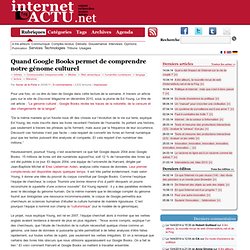
Search engine data visualisations. I’ve decided I need a single place to put all of the search engine data visuals that I’ve been working on. The visuals are made up of thousands of actual queries put into search engines by UK users over the course of a year. This gives us an idea of ‘search demand’ which can/may/should equal actual, offline demand for a topic. Feel free to republish however please link to this blog and also to James Webb who helped to create them. La question de la langue à l'époque de Google. The Google Alphabet: An Autocomplete Snapshot From A to Z.
Christopher Clark. 3'-Sémiométrie.
Google Fight : make a fight with Googlefight. Googlefight! By Avraham Roos Googlefight.com.
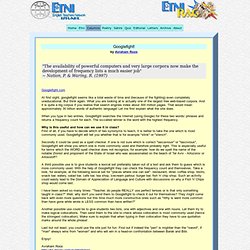
Leetaru. Quantitative Analysis of Culture Using Millions of Digitized Books. A Taxonomy of Ideas? Les mots les plus utilisés dans les slogans publicitaires créés en 2012. Bienvenue dans l'Observatoire des slogans publicitaires.
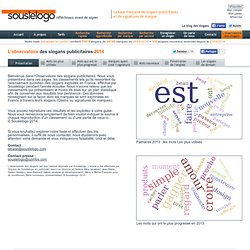
Nous vous présentons dans ces pages, les classements tels qu'ils ressortent du recensement quotidien des slogans exploités en France, effectué par Souslelogo pendant l'année écoulée. Nous n'avons retenu que les classements qui présentaient le moins de biais sur un plan statistique afin de conserver aux résultats leur pertinence. Ces données renseignent sur la façon dont les marques se sont exprimées en France à travers leurs slogans (Claims ou signatures de marques). Vous pouvez reproduire ces résultats et les exploitez à votre guise. The Most Popular Words in the Most Viral Headlines. 6.3K Flares Filament.io 6.3K Flares × There is no one way to create viral content.
So many different variables go into a viral post—timing, emotion, engagement, and so many others that you cannot control. There is no viral blueprint. The greatest chance we have to understand viral content is to study the posts and places that do it best, figure out what worked for them, and try it for ourselves. Thanks to some incredible work by the team at Ripenn, we have access to headline analysis from four of the top viral sites on the web—who happen to be really good at headline writing. The top words used in viral headlines The headline data from Ripenn came from four of the most click-worthy sites on the web—BuzzFeed, ViralNova, UpWorthy and Wimp.
In total, I examined 3,016 headlines from 24 top content sites. (The table at left shows common words—articles, prepositions, pronouns, etc. Rappers, Ranked By Vocabulary-Size. What we learned from 5 million books. Google and the world brain - Polar Star Films - The most ambitious project ever conceived on the Internet. [DOCU] Le Livre selon Google [1080p] MemeTracker: tracking news phrases over the web.
Eigenfactor. Bluefin Mines Social Media To Improve TV Analytics. "A short saying oft contains much wisdom" "A fine quotation is a diamond in the hand of a man of wit and a pebble in the hand of a fool" Culturomics research uses quarter-century of media coverage to forecast human behavior. "Culturomics" is an emerging field of study into human culture that relies on the collection and analysis of large amounts of data. Culturomics 2.0: Forecasting large-scale human behavior using global news media tone in time and space. Global geocoded tone of all Summary of World Broadcasts content January 1979–April 2011 mentioning “Bin Laden” (click to view animation). (Credit: UIC) Computational analysis of large text archives can yield novel insights into the functioning of society, recent literature has suggested, including predicting future economic events, says Kalev Leetaru, Assistant Director for Text and Digital Media Analytics at the Institute for Computing in the Humanities, Arts, and Social Science at the University of Illinois and Center Affiliate of the National Center for Supercomputing Applications.
Algorithm Distinguishes Memes from Ordinary Information — The Physics arXiv Blog. Memes are the cultural equivalent of genes: units that transfer ideas or practices from one human to another by means of imitation. In recent years, network scientists have become increasingly interested in how memes spread. This kind of work has led to important insights into the nature of news cycles, into information avalanches on social networks and into the role that networks themselves play in this spreading process. But what exactly makes a meme and distinguishes it from other forms of information is not well understood. Today, Tobias Kuhn at ETH Zurich in Switzerland and a couple of pals say they’ve developed a way to automatically distinguish scientific memes from other forms of information for the first time. And they’ve used this technique to find the most important ideas in physics and how they’ve evolved in the last 100 years. The word ‘meme’ was coined by the evolutionary biologists Richard Dawkins in his 1976 book The Selfish Gene. 1. loop quantum cosmology.
De 1950 à 2010: 60 ans de prénoms en France. Bookworm arXiv. Wanna Be Famous? Science Says Get There By Age 30.